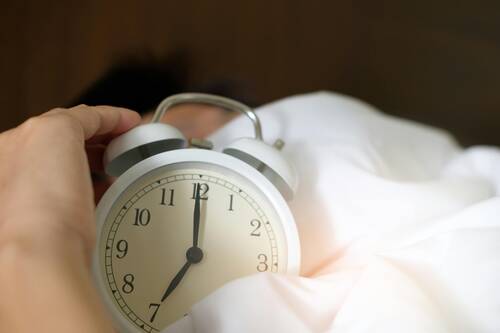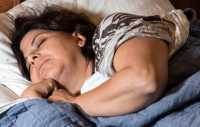Editor’ note: Cannabis and THCA/HEMP CBD products should have an active ingredient list on the container and have a Certificate of Analysis (COA). As with any supplement, it’s important to research and consult with a professional to find the right fit for you. your use of CBD products with your health care provider. Dosing of CBD is variable, especially since it is not FDA regulated. CBD may interfere with other medications and should not be used in individuals with certain health conditions, including liver issues. CBD skin care products can be absorbed through the skin and have similar effects. Do not use Cannabis products including edibles and CBD if you are pregnant, nursing or may become pregnant. Do not use cannabis products if driving or operating difficult or dangerous machinery.
Children should not be exposed to cannabis or CBD products.
Managing stress and getting a good night’s sleep can feel like a real challenge. Whether it’s work deadlines, family responsibilities, or just life’s endless to-do list, it’s easy to feel overwhelmed. And when stress piles up, sleep tends to suffer, creating a frustrating cycle that’s hard to break. "The good news is there are simple, natural ways, like using gummies for sleep, to help take back control and help your body and mind unwind.".
Why Natural Remedies?
While over-the-counter solutions or prescriptions can be helpful, they often come with side effects or the risk of dependency. Natural remedies focus on supporting your body’s ability to relax and reset, rather than masking symptoms. Plus, they’re easy to incorporate into your life and can be a great first step before exploring other options.
(more…)
Author Interviews, Insomnia, Pediatrics / 17.02.2022
Childhood Insomnia: Parents and Providers Should Not Assume Symptoms Will Go Away
MedicalResearch.com Interview with:
Julio Fernandez-Mendoza, PhD, CBSM, DBSM
Associate Professor of Psychiatry & Behavioral Health
Sleep Research & Treatment Center
Director, Behavioral Sleep Medicine Program
Penn State Health Milton S. Hershey Medical Center
MedicalResearch.com: What is the background for this study? Is insomnia familial?
Response: Consistent research has shown that about 25% of school-age children have insomnia symptoms consisting of difficulties initiating or maintaining sleep. However, what has remained unknown is to what extent those insomnia symptoms persist all the way into adulthood, or whether they developmentally remit (go away with age) as the child grows into adolescence or young adulthood. This is the question that our study focused on.
(more…)
Cannabis, Insomnia / 10.09.2021
Does CBD Function as a Sleep Aid?
You should always see a doctor first if you have poor sleep quality, have trouble falling asleep, or staying asleep...
Author Interviews, Brigham & Women's - Harvard, Endocrinology, Insomnia, Menopause, Sleep Disorders, Weight Research / 23.03.2021
Poor Sleep During Menopause Linked to Decreased Fat Metabolism
MedicalResearch.com Interview with:
Leilah K. Grant, PhD
Postdoctoral Research Fellow in Medicine
Brigham and Women’s Hospital
Harvard Medical School
MedicalResearch.com: What is the background for this study?
Response: The prevalence of obesity increases in women around the age of menopause which increases the risk of diseases like diabetes and heart disease. Changes in hormones, like estrogen, are thought to contribute to weight gain during menopause, but other common symptoms of menopause such as sleep interruption may also play a role. While short sleep is known to adversely affect metabolism, little is known about the metabolic consequences of the type of sleep disruption most common in menopausal women – increased nighttime awakenings (i.e., sleep interruption) caused by hot flashes, but no change in overall sleep duration. We therefore did this study to see how an experimental model menopause-related sleep interruption would affect metabolic outcomes that may contribute to weight gain. (more…)
Author Interviews, Brigham & Women's - Harvard, COVID -19 Coronavirus, Insomnia, Obstructive Sleep Apnea, Sleep Disorders / 29.10.2020
Did We Sleep More or Less During COVID-19 Pandemic?
MedicalResearch.com Interview with:
Salma Batool-Anwar, MBBS, MPH
Instructor, Harvard Medical School
Pulmonary and Critical Care, Sleep Medicine
Brigham and Women's Faulkner Hospital
MedicalResearch.com: What is the background for this study?
Response: A well functioning sleep-wake cycle is vital to our health and prevention of chronic diseases.
During previous disaters sleep disturbances have been reported.
When Massachusetts governor declared a state of emergency in March’20, we hypothesized that sleep duration would be adversely affected by covid-19 related lockdown and stress.
The study was approved by the institutional review board and information was collected retrospectively using the electronic medical records. (more…)
Author Interviews, Eisai, Insomnia / 02.10.2020
SUNRISE 2 Trial: Long-Term Safety and Efficacy of DAYVIGO™ (lemborexant) For Insomnia in Adults
MedicalResearch.com Interview with:
Margaret Moline, PhD
Executive Director, Neurology Business Group, Eisai, Inc
Lemborexant International Program Lead and Global Medical Lead
MedicalResearch.com: What is the background for this study? What are the main findings?
- SUNRISE 2 was one of two pivotal Phase 3 studies evaluated in the U.S. Food and Drug Administration’s approval of DAYVIGO (lemborexant) CIV in December 2019.
- SUNRISE 2 was a pivotal six-month placebo-controlled treatment trial with a 6-month active treatment period including adult patients age 18 or older who met DSM-5 criteria for insomnia disorder.
- Patients were randomized to placebo (n=325), DAYVIGO 5 mg (n=323), or DAYVIGO 10 mg (n=323) once nightly for the first six months of the study (Treatment Period 1).
- The primary efficacy endpoint was the mean change from baseline to end of treatment at six months for subjective sleep onset latency (sSOL; the estimated minutes from the time that the patient attempted to sleep until sleep onset).
- Secondary efficacy endpoints were mean change from baseline to end of treatment at six months subjective sleep efficiency (sSE; the proportion of time spent asleep per time in bed) and subjective wake after sleep onset (sWASO; the minutes of wake from the onset of sleep until wake time). These endpoints were measured by sleep diary.
- At Virtual SLEEP 2020, a post-hoc analysis of SUNRISE 2 was shared in an oral presentation, which looked specifically at the long-term efficacy and safety of lemborexant in elderly adults with insomnia disorder.
- Insomnia disorder, a chronic condition with long-term consequences for health and well-being, is prevalent in older adults.
- This analysis of the SUNRISE 2 data reflects new learnings on the sustained impact of DAYVIGO on sleep onset and sleep maintenance in an older patient population.
Author Interviews, Insomnia, Sleep Disorders / 09.07.2020
Optimistic People Sleep Better
MedicalResearch.com Interview with:
Jakob Weitzer MSc
Department of Epidemiology
Center for Public Health
Medical University of Vienna
Vienna, Austria
MedicalResearch.com: What is the background for this study?
Response: Chronic insomnia is a highly prevalent, often underdiagnosed and undertreated disease. Previous research has linked dispositional optimism to a better sleep quality and to insomnia symptoms, and showed that optimism can be trained. Since we think that positive psychology plays an important role for our health we wanted to further shed light on this topic. (more…)
Author Interviews, Insomnia, Kidney Disease / 04.11.2017
Chronic Insomnia Associated With Higher Risk of End Stage Kidney Disease and Mortality
MedicalResearch.com Interview with:
Dr. Jun Ling (Lucy) Lu, MD, CCRP
Senior Clinical Research Coordinator in the Department of Medicine
Csaba P Kovesdy MD FASN
Fred Hatch Professor of Medicine
Director, Clinical Outcomes and Clinical Trials Program
Division of Nephrology, University of Tennessee Health Science Center
Nephrology Section Chief, Memphis VA Medical Center
Memphis TN, 38163
MedicalResearch.com: What is the background for this study? What are the main findings?
Response: Around one third of the world’s population suffers from insomnia. Previous studies showed that sleep disorders affect the hypothalamic–pituitary–adrenal axis and the sympatho-adrenal system, which may cause abnormalities in several organ systems and pathways causing metabolic or cardiovascular abnormalities. However, there is inadequate evidence of an association between chronic insomnia and adverse renal outcomes.
After examining 938,473 US veterans (4.4% of them had chronic insomnia) with baseline estimated eGFR >60 ml/min/1.73m2, we found that chronic insomnia is associated with a 43% higher risk of all-cause mortality, a 2.5-fold higher incidence of eGFR ≤45ml/min/1.73m2, a 2.3-fold higher ESRD risk, and with rapid loss of kidney function.
(more…)
Author Interviews, Heart Disease, Insomnia / 31.03.2017
Insomnia Linked to Increased Risk of Stroke and Heart Attack
MedicalResearch.com Interview with:
Qiao He
Master’s degree student
China Medical University
Shenyang, China
MedicalResearch.com: What is the background for this study?
Response: Sleep is an important factor for biological recovery functions, but in modern society, more and more people have complained having sleep problems like insomnia, one of the main sleep disorders. It is reported that approximately one-third of the German general population has been suffering from insomnia symptoms. In decades, many researchers have found associations between insomnia and bad health outcomes. Insomnia seems to be a big health issue. However, the results from previous studies regarding the association of insomnia and cardiovascular or cerebrovascular events were inconsistent. Therefore, we conducted this study.
(more…)
Author Interviews, Insomnia, JAMA / 02.12.2016
Insomniacs May Benefit From Internet Delivered Program
MedicalResearch.com Interview with:
Lee M. Ritterband, Ph.D.
Professor, Department of Psychiatry and Neurobehavioral Sciences
Director, Center for Behavioral Health and Technology
University of Virginia School of Medicine
Ivy Foundational Translational Research Building
Charlottesville, VA 22903
MedicalResearch.com: What is the background for this study?
Response: Cognitive behavioral therapy for insomnia, a non-pharmacological intervention, is the first line recommendation for adults with chronic insomnia (see recommendations made earlier this year from the American College of Physicians). Access to CBT-I, however, is limited by numerous barriers, including a limited supply of behavioral medicine providers. One way to help improve access to this effective treatment is to develop and evaluate additional delivery methods of CBT-I, including Internet-delivered CBT-I.
This study was designed to evaluate the efficacy of an Internet-delivered CBT-I program (SHUTi: Sleep Healthy Using The Internet) over the short-term (9-weeks) and long-term (1-year).
(more…)
Author Interviews, Blood Pressure - Hypertension, Insomnia, Sleep Disorders / 28.04.2016
Treating Insomnia May Improve Blood Pressure Control
MedicalResearch.com Interview with:
Haicong Li
Director and Professor, Department of Geriatrics
China-Japan Friendship Hospital
Beijing, China.
MedicalResearch.com: What is the background for this study? What are the main findings?
Response: Based on our clinical observations over the years, we noticed two common
phenomena:
- One is that the occurrence of hypertension in patients with chronic sleep disorders tend to be higher than those with normal sleep conditions;
- The other is that the blood pressure of some hypertensive patients cannot be lowered to normal level even with anti-hypertensive treatments, of which group many have sleep disorders.
Author Interviews, Insomnia, Psychological Science / 12.09.2015
Emotional Lability and Insomnia Linked
 MedicalResearch.com Interview with:
Markus Jansson-Fröjmark PhD
Associate professor, clinical psychologist
Department of Psychology
Stockholm University
Medical Research: What is the background for this study? What are the main findings?
Response: There is ample evidence suggesting that how people regulate their emotions might influence several types of psychopathology, including anxiety and mood disorders. The purpose of our longitudinal investigation was therefore to examine the association between emotion regulation and how insomnia develops over time. Our main finding was that people whose ability to regulate their emotions had diminished were more likely to develop insomnia and that it was more likely to be persistent. A reduced ability to regulate emotions was associated with an 11% increased risk of developing a new bout of insomnia or reporting persistent insomnia. For anyone that has to deal with insomnia on a daily basis, they may find that is can effect a large part of their lives. Sleep is important for even, as it allows us all to function properly throughout the day. When it comes to Insomnia, there is medication out there that people can take that may help them with this issue. A popular method of treatment is through the use of medical marijuana. If this is something that you have been planning on trying, you would need to obtain your medical marijuana card in Cincinnati (if you live in this city) before you could start receiving product. Hopefully this will help with your insomnia and provide you with a better quality of sleep.
(more…)
MedicalResearch.com Interview with:
Markus Jansson-Fröjmark PhD
Associate professor, clinical psychologist
Department of Psychology
Stockholm University
Medical Research: What is the background for this study? What are the main findings?
Response: There is ample evidence suggesting that how people regulate their emotions might influence several types of psychopathology, including anxiety and mood disorders. The purpose of our longitudinal investigation was therefore to examine the association between emotion regulation and how insomnia develops over time. Our main finding was that people whose ability to regulate their emotions had diminished were more likely to develop insomnia and that it was more likely to be persistent. A reduced ability to regulate emotions was associated with an 11% increased risk of developing a new bout of insomnia or reporting persistent insomnia. For anyone that has to deal with insomnia on a daily basis, they may find that is can effect a large part of their lives. Sleep is important for even, as it allows us all to function properly throughout the day. When it comes to Insomnia, there is medication out there that people can take that may help them with this issue. A popular method of treatment is through the use of medical marijuana. If this is something that you have been planning on trying, you would need to obtain your medical marijuana card in Cincinnati (if you live in this city) before you could start receiving product. Hopefully this will help with your insomnia and provide you with a better quality of sleep.
(more…)
Author Interviews, Insomnia, JAMA, Mental Health Research / 07.07.2015
Cognitive Behavioral Therapy May Help Many Patients With Insomnia
 MedicalResearch.com Interview with:
Jason Ong, Ph.D., CBSM
Associate Professor, Department of Behavioral Sciences
Director, Behavioral Sleep Medicine Training Program
Rush University Medical Center
Medical Research: What is the background for this study? What are the main findings?
Response: Insomnia is a very common sleep problem that was previously thought to be related to another medical or psychiatric condition. Evidence now supports the notion that insomnia can emerge as a disorder distinct from the comorbid condition. In this study, we evaluated the effectiveness of cognitive behavioral therapy for insomnia (CBT-I), the most widely used nonpharmacologic treatment for insomnia, in the context of medical and psychiatric comorbidities.
We conducted a systematic review and meta-analysis of 37 studies and found that 36% of patients who received cognitive behavioral therapy for insomnia were in remission at post-treatment compared to 17% who received a control or comparison condition. CBT-I had medium to large effects for improving sleep quality and reducing the amount of time awake in bed. Positive findings were also found on the comorbid condition, with greater improvements in psychiatric conditions compared to medical conditions.
(more…)
MedicalResearch.com Interview with:
Jason Ong, Ph.D., CBSM
Associate Professor, Department of Behavioral Sciences
Director, Behavioral Sleep Medicine Training Program
Rush University Medical Center
Medical Research: What is the background for this study? What are the main findings?
Response: Insomnia is a very common sleep problem that was previously thought to be related to another medical or psychiatric condition. Evidence now supports the notion that insomnia can emerge as a disorder distinct from the comorbid condition. In this study, we evaluated the effectiveness of cognitive behavioral therapy for insomnia (CBT-I), the most widely used nonpharmacologic treatment for insomnia, in the context of medical and psychiatric comorbidities.
We conducted a systematic review and meta-analysis of 37 studies and found that 36% of patients who received cognitive behavioral therapy for insomnia were in remission at post-treatment compared to 17% who received a control or comparison condition. CBT-I had medium to large effects for improving sleep quality and reducing the amount of time awake in bed. Positive findings were also found on the comorbid condition, with greater improvements in psychiatric conditions compared to medical conditions.
(more…)
Annals Internal Medicine, Author Interviews, Insomnia, Psychological Science / 10.06.2015
Cognitive Therapy May Be Safe and Effective For Chronic Insomnia
MedicalResearch.com Interview with:
Dr David Cunnington
Sleep Physician & Director
Melbourne Sleep Disorders Centre
East Melbourne Australia
Medical Research: What is the background for this study? What are the main findings?
Response: Insomnia is a very common problem with 15-20% of adults having chronic insomnia, that is, trouble getting to sleep or staying asleep most days for 3 months or more. The most commonly used treatment is sleeping pills or hypnotics, however, they don’t address the underlying disorder, and come with potential side effects. Also, sleeping tablets just mask the symptoms, and as soon as tablets are stopped, symptoms recur. People with chronic insomnia think and behave differently around sleep, which perpetuates their symptoms. The key to improving symptoms in the long run is addressing thoughts and behaviours around sleep, which is what cognitive behaviour therapy does.
Our study showed that cognitive behaviour therapy reduced the time taken to get to sleep by 20 minutes and reduced the amount of time spent awake after falling asleep by nearly 30 minutes. These effects were maintained out to 12 months after treatment. These reductions in time taken to get to sleep and time spent awake are similar to those reported in clinical trials of hypnotics. (more…)
Alcohol, Author Interviews, Insomnia / 23.12.2014
Links Between Alcohol, Insomnia and Suicide Risk Explored
 MedicalResearch.com Interview with:
Michael Nadorff, PhD, Assistant professor
Mississippi State University
Starkville, Miss.
Medical Research: What is the background for this study? What are the main findings?
Dr. Nadorff: A growing literature has found that insomnia symptoms are associated with suicidal behavior, and several studies suggest that this relation may be independent of several different forms of psychopathology. However, little research has examined the role sleep disorders, such as insomnia, play in explaining why known risk factors, such as alcohol use, are associated with suicidal behavior. In our study, we examined whether insomnia symptoms explained a significant portion of the relation between alcohol symptoms and suicide risk. We found that for both men and women insomnia symptoms explained a significant amount of the variance in the relation between alcohol use and suicide risk.
(more…)
MedicalResearch.com Interview with:
Michael Nadorff, PhD, Assistant professor
Mississippi State University
Starkville, Miss.
Medical Research: What is the background for this study? What are the main findings?
Dr. Nadorff: A growing literature has found that insomnia symptoms are associated with suicidal behavior, and several studies suggest that this relation may be independent of several different forms of psychopathology. However, little research has examined the role sleep disorders, such as insomnia, play in explaining why known risk factors, such as alcohol use, are associated with suicidal behavior. In our study, we examined whether insomnia symptoms explained a significant portion of the relation between alcohol symptoms and suicide risk. We found that for both men and women insomnia symptoms explained a significant amount of the variance in the relation between alcohol use and suicide risk.
(more…)
Accidents & Violence, Author Interviews, Insomnia / 02.11.2014
Insomnia Major Contributor To Fatal Falls and Motor Vehicle Accidents
 MedicalResearch.com Interview with:
Lars Laugsand, MD, PhD, Postdoctoral fellow
Department of Public Health
Norwegian University of Science in Technology
Trondheim, Norway.
Medical Research: What is the background for this study?
Dr. Laugsand: Very few prospective studies have assessed the association of insomnia symptoms and risk for injuries.
Medical Research: What are the main findings?
Dr. Laugsand: We found that increasing number of insomnia symptoms was strongly associated with higher risk for both overall unintentional fatal injuries and fatal motor-vehicle injuries in a dose-dependent manner. Those who reported to suffer from all major insomnia symptoms were at considerably higher risk than those who had no symptoms or only a few symptoms. Among the different insomnia symptoms, difficulties falling asleep appeared to have the strongest and most robust association with fatal injuries.
(more…)
MedicalResearch.com Interview with:
Lars Laugsand, MD, PhD, Postdoctoral fellow
Department of Public Health
Norwegian University of Science in Technology
Trondheim, Norway.
Medical Research: What is the background for this study?
Dr. Laugsand: Very few prospective studies have assessed the association of insomnia symptoms and risk for injuries.
Medical Research: What are the main findings?
Dr. Laugsand: We found that increasing number of insomnia symptoms was strongly associated with higher risk for both overall unintentional fatal injuries and fatal motor-vehicle injuries in a dose-dependent manner. Those who reported to suffer from all major insomnia symptoms were at considerably higher risk than those who had no symptoms or only a few symptoms. Among the different insomnia symptoms, difficulties falling asleep appeared to have the strongest and most robust association with fatal injuries.
(more…)
Aging, Author Interviews, Insomnia / 13.10.2014
Insomnia Symptoms May Not Reflect Objective Sleep Measurements
MedicalResearch.com Interview with:
Jen-Hao Chen, Ph.D.
Assistant Professor, Department of Health Sciences
University of Missouri, Columbia, MO 65211
Medical Research: What are the main findings of the study?
Dr. Chen: In this study, we mapped four commonly-reported insomnia symptoms (feeling rested when waking up, having trouble falling asleep, waking up during the night, waking up too early and not being able to fall asleep again) to direct assessment of sleep characteristics in the general population of U.S. older adults. While we know older adults frequently complain about their sleep, we know little about how these complain reflect older adults’ actual sleep outcomes.
Using innovative actigraphy data of 727 older adults aged 62-91 from the National Social Life, Health and Aging Project, we found that two of these four common report of insomnia symptoms did not match specific objective sleep characteristics as these questions intends to index. The question of feeling rested was not related to any objective sleep characteristic. The question of difficulty falling asleep was not related to the objective measure of time to fall sleep but was related to other objective sleep characteristics. For waking up during the night question, high frequency was associated with more wake time after sleep onset and numbers of wake bout (but was also related to other objective sleep characteristics). For waking up too earlier question, answer of this question was related to earlier wake up time. But again, other objective sleep characteristics also predicted frequency of waking up earlier.
In sum, many of the relationships and non-relationships found in this study were unexpected. Findings suggested that these widely used questions did not related to older adults’ sleep outcomes as exactly as the wording suggested. Thus, while older adults’ report of these questions are related to objective sleep characteristics in some ways, insomnia symptoms and objective sleep characteristics did not complete match each other as expected.
(more…)
 MedicalResearch.com Interview with:
Dr. Claire Sexton Ph.D.
University of Oxford
Medical Research: What are the main findings of the study?
Dr. Sexton: We found that sleep difficulties (which can include trouble falling asleep, waking up during the night, or waking up too early) were associated with an increased rate of decline in brain volumes over 3-5 years.
(more…)
MedicalResearch.com Interview with:
Dr. Claire Sexton Ph.D.
University of Oxford
Medical Research: What are the main findings of the study?
Dr. Sexton: We found that sleep difficulties (which can include trouble falling asleep, waking up during the night, or waking up too early) were associated with an increased rate of decline in brain volumes over 3-5 years.
(more…) MedicalResearch.com Interview with:
Tea Lallukka, PhD
Finnish Institute of Occupational Health &
University of Helsinki, Hjelt Institute, Department of Public Health
University of Helsinki, Finland
Medical Research: What are the main findings of the study?
Dr. Lallukka: Our study used nationally representative survey data linked with
register data on medically certified sickness absence among working
-aged Finnish women and men. We showed consistent associations between
insomnia symptoms, sleep duration, and being tired and sickness
absence. The follow-up lasted around 7 years.
Sickness absence days were derived from comprehensive registers from
the Social Insurance Institution of Finland. The associations were
broadly similar among women and men. Furthermore, they remained even
after considering key correlates of sleep and sickness absence
including socioeconomic position, working conditions, health
behaviors, obesity, and mental and physical health. Health data were
derived from physical examination conducted by field physicians. These
data are more objective, and help provide more robust evidence. We
further covered all key sleep disturbances and sleep duration for more
comprehensive understanding about the contribution of sleep to
sickness absence. Finally, a novel method developed by the authors
(Härkänen & Kaikkonen) allowed us to estimate the difference in
sickness absence days per working year among those reporting and not
reporting different sleep disturbances. Using the difference in days
absent from work, we were further able to estimate the hypothetical
direct costs of sickness absence highlighting notable societal
significance of sleep. Thus, a large part of all costs of sickness
absence are attributable to poor sleep. For example, those sleeping 5
hours or less or 10 hours or more, were absent from work ca 5-9 days
more, as compared to those with optimal sleep length. The optimal
sleep length with the lowest risk of sickness absence was 7 hours 46
minutes for men and 7 hours 38 minutes for women.
(more…)
MedicalResearch.com Interview with:
Tea Lallukka, PhD
Finnish Institute of Occupational Health &
University of Helsinki, Hjelt Institute, Department of Public Health
University of Helsinki, Finland
Medical Research: What are the main findings of the study?
Dr. Lallukka: Our study used nationally representative survey data linked with
register data on medically certified sickness absence among working
-aged Finnish women and men. We showed consistent associations between
insomnia symptoms, sleep duration, and being tired and sickness
absence. The follow-up lasted around 7 years.
Sickness absence days were derived from comprehensive registers from
the Social Insurance Institution of Finland. The associations were
broadly similar among women and men. Furthermore, they remained even
after considering key correlates of sleep and sickness absence
including socioeconomic position, working conditions, health
behaviors, obesity, and mental and physical health. Health data were
derived from physical examination conducted by field physicians. These
data are more objective, and help provide more robust evidence. We
further covered all key sleep disturbances and sleep duration for more
comprehensive understanding about the contribution of sleep to
sickness absence. Finally, a novel method developed by the authors
(Härkänen & Kaikkonen) allowed us to estimate the difference in
sickness absence days per working year among those reporting and not
reporting different sleep disturbances. Using the difference in days
absent from work, we were further able to estimate the hypothetical
direct costs of sickness absence highlighting notable societal
significance of sleep. Thus, a large part of all costs of sickness
absence are attributable to poor sleep. For example, those sleeping 5
hours or less or 10 hours or more, were absent from work ca 5-9 days
more, as compared to those with optimal sleep length. The optimal
sleep length with the lowest risk of sickness absence was 7 hours 46
minutes for men and 7 hours 38 minutes for women.
(more…)
Author Interviews, Insomnia, Mental Health Research / 31.07.2014
Adolescent Insomnia Linked to Depression, Anxiety and Chronotype
MedicalResearch.com Interview with:
Pasquale K Alvaro
School of Psychology
University of Adelaide
South Australia, Australia
Medical Research: What are the main findings of the study?
Answer: In adolescents, insomnia is related to depression beyond chronotype (a classification system for circadian rhythms or body clock), anxiety and age. Insomnia is also related to Generalised Anxiety Disorder (GAD) beyond chronotype, depression and age. Depression accounts for the relationship between insomnia and Obsessive Compulsive Disorder (OCD), Separation Anxiety Disorder (SAD) and Social Phobia (SP). Furthermore, an evening chronotype (delayed sleep phase, that is, preferring to go to bed in the early morning) predicts insomnia beyond depression, anxiety and age. Moreover, an evening chronotype predicts depression beyond insomnia, anxiety and age. Finally, insomnia and depression account for the relationships between an evening chronotype and panic disorder, OCD, SAD and SP.
(more…)
Author Interviews, Insomnia, Johns Hopkins, Sleep Disorders / 12.06.2013
Insomnia and Health Services Utilization in Middle-Aged, Older Adults
Hemodialysis.com Interview with: Christopher Kaufmann, MHS
Department of Mental Health,
Johns Hopkins Bloomberg School of Public Health
Hampton House, Room 800
624 North Broadway
Baltimore, MD 21205
email: [email protected]
MedicalResearch.com: What are the main findings of the study?
Mr. Kaufmann: The purpose of our study was to examine the association between insomnia and the use of a number of costly health services. We used data from the Health and Retirement Study, a large nationally representative longitudinal population-based study of US middle-aged and older adults. We found that individuals who reported a greater number of insomnia symptoms were more likely to report being hospitalized, using home healthcare services, and using nursing homes two years later. After we accounted for a number of demographic and clinical characteristics, the association between number of reported insomnia symptoms and hospitalization remained statistically significant.
(more…)






